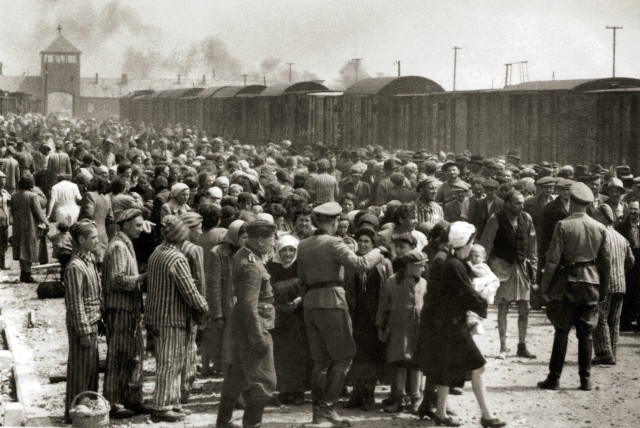'With Many Miracles': Israel Cappell’s miraculous story of survival - review

Israel Cappell details his remarkable survival in Nazi-occupied Europe.
Survival against the odds is the theme running through Israel Cappell’s account of living through World War II in Nazi-occupied Europe. Mirroring Cappell’s own story is that of how his handwritten memoir survived, to be transformed into a carefully edited text and eventually appear in print. An inspiring tale in itself of willing cooperation from many hands, it appears in the Editors’ Note at the very beginning of With Many Miracles: A Memoir of Holocaust Survival in Belgium.
Israel Cappell (originally Kapelusznik) was born in Lodz, Poland, in 1922. During WW I, Poland fell under German sovereignty. Its independence restored in 1918, a feature of Polish life in the following years was the growth of antisemitism. Jews began emigrating en masse. The Kapelusznik family joined the movement westward, and in 1930 they relocated to Brussels.
The choice of Brussels was fortuitous, but it was fortunate indeed. Compared with many another location in Western Europe, and certainly with almost everywhere farther east, life of a sort remained possible for Jews in Belgium for much of the war. During the surrender deal with the Nazis, Queen Elisabeth of the Belgians managed to extract an undertaking – sometimes kept and sometimes broken – that they would allow old-age homes and children’s orphanages to continue functioning. Another mitigating factor was that a resistance movement was active from early on and supported Jews in hiding, supplying them when necessary with falsified papers. As a result, some 50 percent of Belgian Jews survived the Holocaust.
Cappell recounts in vivid detail how, with more luck than he had any right to expect, he managed to evade capture by the Gestapo in wartime Brussels. The family succeeded in finding Belgians prepared to defy the Nazis, and fleeing their comfortable home they moved between rented apartments and low-grade hotels, playing cat and mouse with the Gestapo. As he puts it: “Belgium was hardly safe…The distance between the civilized streets of Brussels or Antwerp and the horrors of Auschwitz was just a train ride away, if one was caught.”
The Cappell family learned the bitter truth of this when Israel’s sister-in-law left the house one morning and simply vanished. They never saw her again. She had been seized by the Gestapo, and her life ended in the death camp at the age of 21.
Cappell's story of survival
Cappell and his family evaded capture for four years “until,” as he writes, “one night, we were savagely arrested by the Gestapo!”
He writes in powerful, graphic terms of his capture, his ill treatment at the hands of the Gestapo, and his eventual incarceration with his brother Charles in the dreaded Kazerne Dossin – the holding camp for Jews awaiting transport to Auschwitz. One of the miracles referred to in the title is how the two, their names confirmed for the next shipment, were suddenly informed that they had been approved for the officially recognized Palestine Exchange List plan.
At the start of the war, thousands of German civilians found themselves marooned in Palestine under British Mandate rule. Because many British subjects were trapped in Nazi-occupied Europe, a low-grade swap system was agreed. Soon, Jews with relatives trapped in Europe began persuading the British authorities to extend the plan.
By 1943, the plan had expanded under Jewish Agency auspices to a system of lists of so-called “veteran Zionist leaders” held in Europe who would be eligible for transfer to Palestine in exchange for German nationals.
Cappell describes how his brother Charles, some time in 1942, had taken the risky step of registering the family as Zionists with the Brussels Palestine Office. While they were held in the Kazerne Dossin, their sister Fanny and her husband, who had managed to evade capture, discovered that the Exchange Lists were in fact enabling some fortunate Jews to escape transportation to Auschwitz. Fanny took the necessary steps to get her brothers’ names added to the Palestine Exchange plan. It was this series of chances that saved Cappell and his brother from ending up in Auschwitz.
On September 3, 1944 – five years to the day from when Britain declared war on Hitler’s Germany – the prisoners were assembled, and the commandant informed them that he and his guards would shortly be leaving. He had decided, he told them, not to kill the Jews under his control because the enemy would use a mass execution as propaganda.
The following day, with the guards gone, the prisoners walked out of the camp and found the British in the process of occupying Brussels.
With Many Miracles is a frank and beautifully written account of Israel Cappell’s war – unique to him and his particular circumstances. He provides a detailed picture of survival in Nazi-occupied Belgium and the miracles that marked his personal journey through the war, and its eventual successful outcome. Utterly absorbing.■
- With Many Miracles: A Memoir of Holocaust Survival in Belgium
- Israel Cappell
- Sarah Abrevaya Stein (Editor), Janine Zacharia (Editor)
- Kapelusznik & Co., 2024
- 220 pages; $17.04 (paperback)
Jerusalem Post Store
`; document.getElementById("linkPremium").innerHTML = cont; var divWithLink = document.getElementById("premium-link"); if (divWithLink !== null && divWithLink !== 'undefined') { divWithLink.style.border = "solid 1px #cb0f3e"; divWithLink.style.textAlign = "center"; divWithLink.style.marginBottom = "15px"; divWithLink.style.marginTop = "15px"; divWithLink.style.width = "100%"; divWithLink.style.backgroundColor = "#122952"; divWithLink.style.color = "#ffffff"; divWithLink.style.lineHeight = "1.5"; } } (function (v, i) { });

